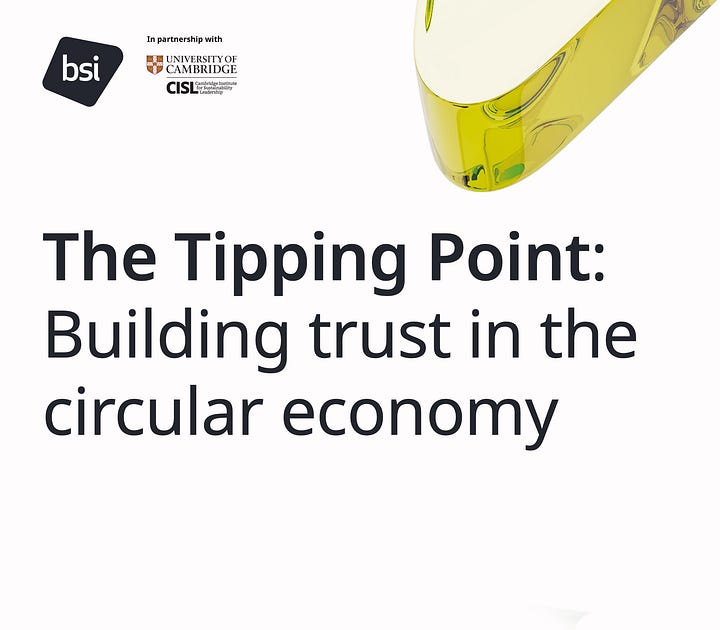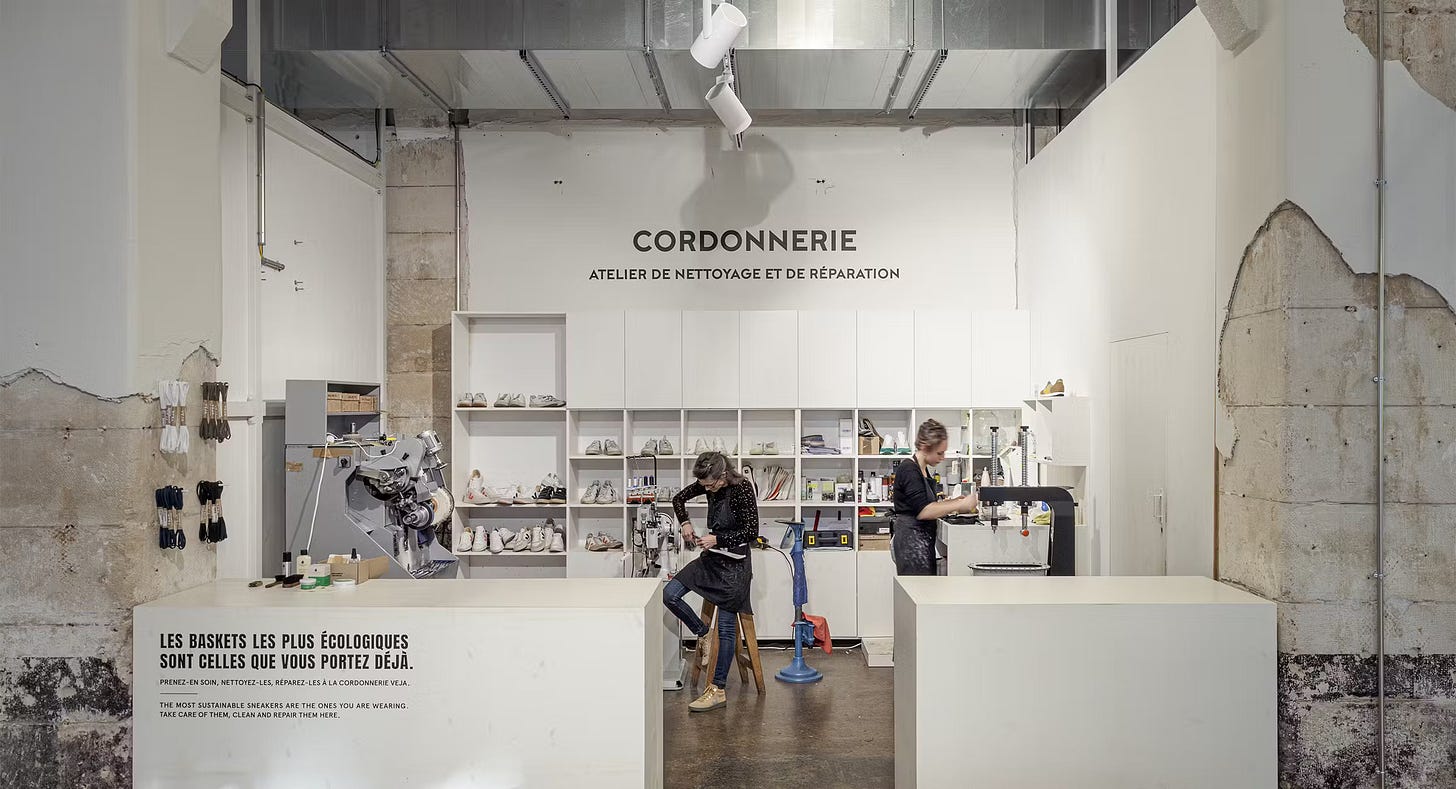Circular Fashion News / July 15: Textile waste problem, Green gap effect, Bio-based textile market size
Last week, calls were made to address Europe's recycling crisis, a study confirmed the persistence of the green gap effect, and forecasts projected the bio-based market to reach $17B by 2034.
Welcome to reading a weekly recap of circular fashion news! Some of last week’s highlights in the circular fashion industry included:
Rehubs announced to be developing an action plan to tackle Europe's textile waste problem
A study revealed that safety and quality concerns prevent consumers from buying secondhand or repaired products
One of the biggest textile sorting players in France issued a warning about the state of France’s textile recycling industry
Farm Rio launched a resale program with Poshmark and ThredUp
Sneaker brand Veja partnered with Prolong to give customers a seamless repair journey
A new forecast projects the bio-based textile market to reach $17 billion by 2034
Sustainability platform Positive Luxury partnered with Buyerdock for a Digital Product Passport solution
Luxury brand Gabriela Hearst launched a line of jeans made from 100% recycled cotton
This section highlights major news impacting the entire circular fashion industry, studies and reports about the state of the industry, current regulation landscape, as well as studies and data about consumer behaviour in the circular fashion market.
Rehubs announced to be developing an action plan to tackle Europe's textile waste problem
ReHubs, an alliance launched by the EURATEX, disclosed that they will release a comprehensive action plan to address the European textile waste crisis. The action plan is being developed in collaboration with over 30 partners, and is set to launch in September this year.
The largest textile sorting player in France issued a warning about the textile recycling industry
Le Relais, one of France’s largest textile collection and sorting operators, has issued a warning about the state of the country’s textile industry. Emmanuel Pilloy, president of Le Relais France, criticized the current compensation levels for sector players, stating they are insufficient to sustain operations.
Currently, handlers of textile waste receive €156 per ton for collecting, sorting and recovering textile waste. Le Relais is calling for this to be increased to €304 per ton – a level it says is necessary to keep operations running, protect jobs, and support long-term viability.
Safety and quality concerns prevent consumers from buying secondhand or repaired products
A global report by the British Standards Institution (BSI) found that many consumers hesitate to choose reused or repaired products due to concerns about quality and safety. The survey gathered insights from over 8,000 individuals worldwide. Key findings include:
Green gap is still persistent: 53% of consumers describe themselves as early adopters in recycling, reusing, or purchasing secondhand. Although, when looking at purchase rates, only 35% are keen to purchase secondhand clothing, 29% refurbished furniture, 25% wonky food produce, and 22% secondhand scooters and bicycles.
Safety and quality concerns: Over half of the respondents said they feared compromising on product quality (56%), safety (51%), and reliability (49%) in the case of buying reused or repaired products.


This section highlights news, collaborations, reports and studies in the space of fashion resale. To get an overview of the fashion resale market and the players operating there, check out the fashion resale company database.
Finnish P2P marketplace, Bought, acquired Netflea
Finnish peer-to-peer secondhand marketplace, Bought, acquired a former Finnish player in the space, Netflea. Netflea was founded in 2014, and the platform had over 200,000 users across 13 European markets.
The operations of Netflea.com were shut down earlier this year, and Bought does not plan to relaunch the marketplace. Instead, the acquisition was about buying a chance to re-engage the platform's past users and leverage their historical purchase data.
Farm Rio launched a resale program with Poshmark and ThredUp
Brazilian fashion and lifestyle brand Farm Rio has launched a two-part resale programme in collaboration with Poshmark and ThredUp.
With Poshmark, Farm Rio launched a peer-to-peer resale platform where customers can sync their verified Farm Rio purchases on the brand's website. Once connected, listings are automatically created with product photos and descriptions, simplifying the selling process.
In partnership with ThredUp, Farm Rio launched a takeback option. Customers can send in their used items (which are resold through ThredUp’s platform) and receive a Farm Rio gift card in return.
This section highlights news, collaborations, reports and studies in the space of fashion repair as well as upcycling.
Veja partners with Prolong to offer customers a seamless repair journey
Sneaker brand Veja announced a partnership with aftercare platform Prolong to introduce a new tech-enabled after-sales service.
Through the partnership, Veja customers in France can now track the full repair journey of their sneakers from drop-off to re-delivery. The service was soft-launched in the spring and is expected to cover all of Veja’s repairs in France by the end of the year. So far, more than 50,000 pairs have been repaired through the platform.
This section highlights news, collaborations, reports and studies in the space of next-gen materials as well as technologies and strategies that help brands design out waste, rethink production systems, and build with longevity, repairability, and recyclability in mind.
Bio-based textile market is expected to grow to $17 billion by 2034
A research conducted by the Polaris Market Research & Consulting expects the bio-based textile market to grow to $17.3 US billion by 2034.
In 2024, the market’s value was $5.8 billion, and it is expected to show a significant CAGR (compound annual growth rate) of 11.6% from 2025 to 2034.
→ Read more
→ Read full research
Sustainability platform Positive Luxury partnered with Buyerdock for a DPP
The sustainability platform, Positive Luxury, has partnered with Buyerdock to create its own Digital Product Passport offering.
The solution combines Buyerdock’s DPP technology with Positive Luxury’s sustainability expertise and certification framework, aiming to support luxury and premium brands in meeting upcoming EU requirements but also in offering deeper post-purchase consumer engagement.
This section highlights news, collaborations, reports and studies in the space of textile-to-textile recycling.
Luxury brand Gabriela Hearst launched a line of jeans made from 100% recycled cotton
Luxury fashion brand Gabriela Hearst has launched a line of jeans made from 100% recycled cotton. No further details were given about the recycling process or the partner used for the recycling.
Insight about the denim market: According to a survey by the Cotton Incorporated, the popularity of denim hasn’t been slowing down. Based on feedback from over 10,000 consumers in 13 markets, nearly half of respondents stated that they’re wearing jeans more than ever.
That is all for now, let’s hear again next week! In the meantime, let’s continue the discussion in the comments, LinkedIn, or Instagram <3
xx Tiina
























